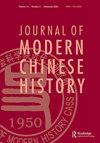May Fourth in three keys: revolutionary, pluralistic, and scientific
IF 0.1
4区 历史学
Q4 HISTORY
引用次数: 0
Abstract
If any topic in modern Chinese history has been “well done,” to the point of being possibly “overcooked,” it is the May Fourth Movement – by which I refer both to the demonstrations of 1919 and to the broader “New Culture” context in which they unfolded. I would suggest that one reason for May Fourth’s being so “well done,” if not in fact “overcooked,” is because intellectuals love to talk about themselves. The May Fourth-era intellectuals talked about themselves a great deal over the decades after 1919, and we intellectuals belonging to the generations that have followed can relate to those historical figures quite easily. And so we (especially contemporary Chinese intellectuals) have interpreted and narrated them at exhaustive length. Deeply attuned to diachronic process as historians are, it is axiomatic among us that the meaning of the past is always changing in light of the constantly unfolding present. Indeed, we might even say that this phenomenon is what keeps historians “in business.” We know well that the past forever needs remodeling and that somebody has got to do that work. The broad array of commemorative and academic events that have taken place in China and the West in honor of May Fourth’s centennial anniversary, not to mention the outpouring of articles and special issues of journals on the subject, make abundantly clear that, “well done” or “overcooked” though it may be, May Fourth’s value has not been exhausted. How then might we think about May Fourth’s ongoing and ever-replenishing meaningfulness? In pondering that question on the occasion of the centennial anniversary I find myself thinking about a book I assign to my college students in order to teach them about the concept of historiography. That book is Paul Cohen’s study of the Boxer Uprising, History in Three Keys: The Boxers as Event, Experience, and Myth. Cohen masterfully lays out the variety of kinds voices that write history – those of professional historians, of participants, and of mythologizers, the latter of whom are less interested in rigorous historical research than they are in the value of the past as a contemporary ideological and political resource. Cohen’s work on the “career” of the Boxer Uprising as a historical subject suggests ways that we may think about May Fourth’s post-1919 “career” as a historical subject. Cohen discusses the New Culture Movement of the late 1910s and early 1920s as a key phase in the history of the different narrations of the Boxer Uprising that unfolded during the twentieth century. With regard to the New Culture Movement,五四的三个关键:革命、多元、科学
如果说中国现代史上有什么话题被“做得很好”,到了可能“煮过头”的地步,那就是五四运动——我指的是1919年的示威活动,以及更广泛的“新文化”背景。我认为,五四之所以“做得好”,如果不是“煮过头”的话,其中一个原因就是知识分子喜欢谈论自己。五四时期的知识分子在1919年之后的几十年里谈了很多关于他们自己的事情,而我们这一代的知识分子可以很容易地与这些历史人物联系起来。因此,我们(尤其是当代中国知识分子)对它们进行了详尽的解读和叙述。作为历史学家,我们对历时过程有着深刻的理解,在我们中间,一个不言自明的事实是,过去的意义总是随着不断展开的现在而变化。事实上,我们甚至可以说,正是这种现象让历史学家“在工作”。我们很清楚,过去永远需要重塑,必须有人来做这项工作。中国和西方为纪念五四百年而举行的一系列纪念和学术活动,更不用说关于这个主题的大量文章和期刊特刊,都充分表明,尽管“做得好”或“煮得过火”,但五四的价值还没有耗尽。那么,我们该如何看待“五四”持续不断、不断充实的意义呢?在一百周年纪念之际思考这个问题时,我发现自己在思考我给大学生布置的一本书,目的是教他们史学的概念。那本书是保罗·科恩对义和团起义的研究,《三键历史:义和团作为事件、经验和神话》。科恩巧妙地列出了书写历史的各种声音——专业历史学家的声音,参与者的声音,以及神话学家的声音,后者对严格的历史研究不太感兴趣,他们更感兴趣的是过去作为当代意识形态和政治资源的价值。科恩关于义和团运动作为一个历史主题的“生涯”的研究,为我们提供了一些思考1919年之后的五四运动作为一个历史主题的“生涯”的方法。科恩讨论了20世纪10年代末和20世纪初的新文化运动,作为20世纪展开的义和团起义的不同叙述历史的关键阶段。关于新文化运动,
本文章由计算机程序翻译,如有差异,请以英文原文为准。
求助全文
约1分钟内获得全文
求助全文

 求助内容:
求助内容: 应助结果提醒方式:
应助结果提醒方式:


